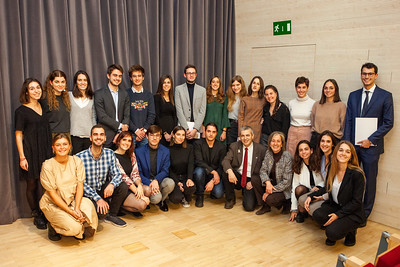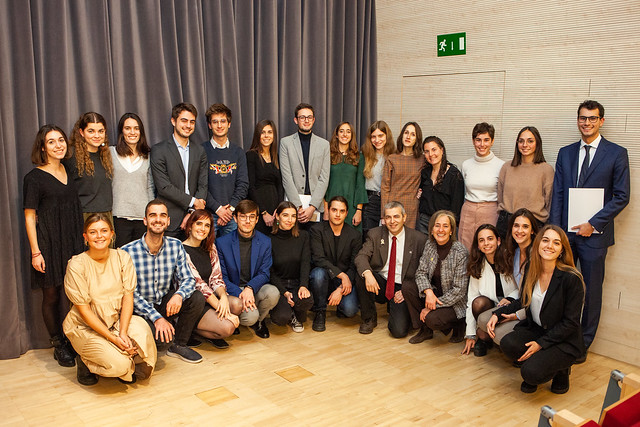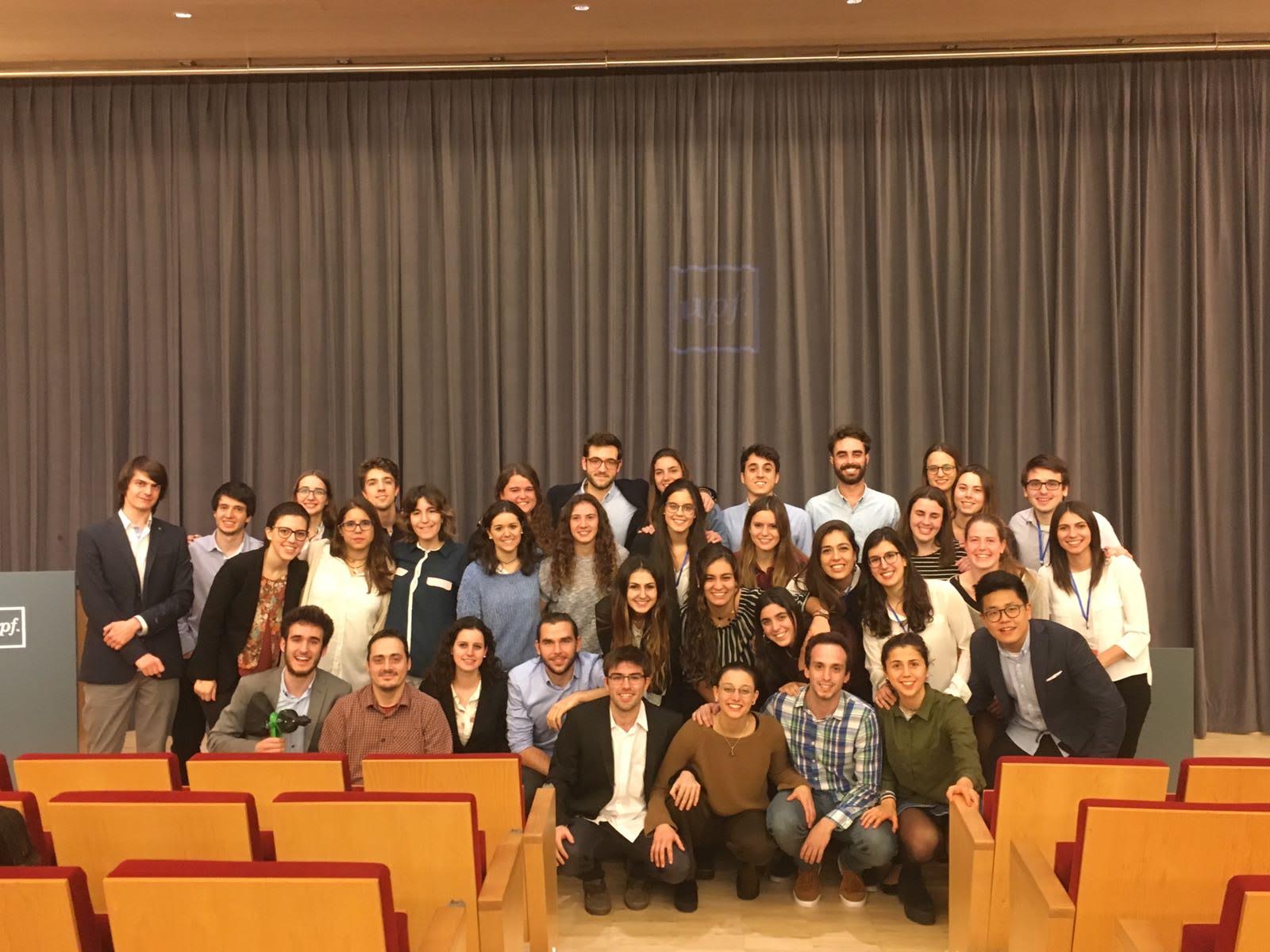21 estudiants de grau premiats pels seus excel·lents resultats acadèmics

Un total de 21 estudiants de grau que van finalitzar els seus estudis el curs 2018-2019 han estat guardonats amb els Premis Extraordinaris de Fi d’Estudis, que reconeixen els millors expedients de cada grau.
L’acte, que va tenir lloc el 19 de desembre a les 19.00 hores, va comptar amb la presència de Cristina Gelpí, vicerectora per a la direcció de projectes per a la docència, i Ramon Villanova, vicerector per a la direcció de projectes per a la comunitat universitària, encarregats de lliurar els diplomes als estudiants.
Llista de guardonats
-
José Manuel Aznar Puyalto, grau en Dret
-
Sergi Barberán Benedicto, grau en Filosofia, Política i Economia
-
Marina Camallonga Teruel, grau en Comunicació Audiovisual
-
Anna Carol Xandri, grau en Criminologia i Polítiques Públiques de Prevenció
-
Oriol Cervelló i Nogués, grau en Enginyeria de Sistemes Audiovisuals
-
Marc Cervera Castro, grau en Administració i Direcció d’Empreses
-
Anna Domínguez Guasch, grau en Medicina
-
Pau Forte Genescà, grau en Biologia humana
-
Rubén García del Horno, grau en Ciències Polítiques i de l’Administració
-
Silvia Gómez Mañé, doble grau en Dret i Administració i Direcció d’Empreses/Economia
-
Alba Llaràs Blanco, grau en Ciències Empresarials-Management
-
Èlia Lleal Custey, grau en Enginyeria Biomèdica
-
Andrea Martí Socias, grau en Traducció i Interpretació
-
Gerard Martín Escofet, grau en Economia
-
Nil Montilla Rodriguez, grau en Periodisme
-
Iris Parra Jounou, grau en Humanitats
-
Elisa Perez Medina, grau en Publicitat i Relacions Públiques
-
Alejandro Rodríguez Corrales, grau en Enginyeria Informàtica
-
Paula Sáez Bosch, grau en Global Studies
Un cop acabat el lliurament de diplomes, Iris Parra Jounou, guardonada del grau en Humanitats, i Pau Forte Genescà, premiat del grau en Biologia Humana, van pronunciar unes paraules, en representació de tots els guardonats.
Lliurament dels premis a millors TFG i TFM sobre responsabilitat social i benestar planetari
En el marc de l’acte també s’han atorgat els premis a millors TFG i TFM sobre responsabilitat social i benestar planetari. En total, 13 estudiants han estat reconeguts per la seva bona tasca en aquest àmbit.
El Premi Càtedra MANGO de Responsabilitat Social Corporativa ESCI-UPF al millor Treball de Final de Grau (TFG) es va concedir a Georgina Latorre, Laura Marca, Marina Martínez i Maria Noguer, estudiants del grau en International Business Economics.
El Premi Càtedra UNESCO de Cicle de Vida i Canvi Climàtic ESCI-UPF al millor TFG sobre benestar planetari va ser per Carles Antón Blasco, estudiant del grau en Enginyeria de Sistemes Audiovisuals.
Dins aquesta categoria també es va atorgar un diploma de menció a Mercè Muñoz, Judit Pescador, Marta Torrent i Júlia Verdaguer, estudiants del doble grau en Dret i Economia.
El Premi Càtedra UNESCO de Cicle de Vida i Canvi Climàtic ESCI-UPF i la UPF Barcelona School of Management als millor treballs de màster va tenir quatre guardonades. La primera és Lena Von Zabern, estudiant del Màster en International studies on Media, Power and Difference. La segona premiada és Sarah Backer Rasmussen, estudiant del mateix màster. El següent premi dins la mateixa categoria es va atorgar a Ruth Fabregat i Paula Valero, estudiants del Master of Science in Finance and Banking.
La lliçó d’enguany, a càrrec d’Ester Oliveras
Ester Oliveras, professora associada del Departament d’Economia i Empresa de la UPF i delegada del rector per a la sostenibilitat, va impartir la lliçó “Fer negoci fent el bé”. En el seu parlament, Oliveras va reflexionar sobre quina és la responsabilitat social de les empreses, posant èmfasi en l’obligació que tenen aquestes de qüestionar-se assumptes com si els salaris que paguen són dignes, si s’està promocionant i contractant de manera justa i no discriminatòria o si s’està contribuint a mantenir el medi ambient. Per aquesta mateixa raó, Oliveras va posar exemples d’empreses que sí que tenen en compte tots aquests aspectes a l’hora de funcionar. Segons la ponent, aquests són “negocis que s’han creat pensant en necessitats socials o mediambientals i que tenen una mirada àmplia i sistèmica, que va més enllà de la maximització de benefici”.
L’actuació del Cor de la UPF va cloure l’acte, amb la interpretació de “Carol of the Bells”, una nadala ucraïnesa, i “Kamalondo”, una cançó popular del Zaire.

Related Assets
Biomedical Engineering students display their innovative research
Yesterday, 1 December, at the Poble Nou campus auditorium within the framework of the subject “Introduction to Medical Devices and their Design” coordinated by Oscar Camara, professor of the Department of Information and Communication Technologies. A teaching activity enjoying the collaboration of organizations linked to the field of biomedicine.
Yesterday, 1 December, in the afternoon on the Poble Nou campus, students from the bachelor’s degree in Biomedical engineering displayed the research projects they are carrying out within the framework of the subject “Introduction to Medical Device and their Design” (IMDD) coordinated by professor Oscar Camara in the Department of Information and Communication Technologies (DTIC) at UPF. This teaching activity enjoys the support of various organizations, research centres, hospitals and companies related to biomedicine.

During the presentation of the projects, the different teams of students present this proof of concept to a panel representing potential clinical investors and users to commit to developing their ideas. This year the panel consisted of the following members: Antonio Ivorra, Oscar Camara, lecturers with UPF’s DTIC, Alvaro Jansà, a member of the BERG Research Group at the DTIC, and Tomás Escuin, from the UPF Business Shuttle - Innovation Unit.
A total of eight projects were presented to the audience during the session held at UPF, on 1 December 2016:
Data analysis for skin cancer diagnosis
”Raman Diagnosis: Low cost Raman spectroscopy for the detection of skin carcinogenicity” by Nilo Adell, Joan Puig, Irene Tena and Guillermo Torrent who have worked with the BERG Research Group at UPF, together with the Institute of Photonic Sciences - ICFO, and Hospital del Mar.
The paper develops a low cost, open source 3D printable Raman spectroscope, coupled with an application for different platforms for the analysis and storage of the scanned data of patients at risk of skin cancer.
New surgical approaches to closing blood vessels
”Vesseal: reducing warm ischaemia and haemorrhages in partial nephrectomies”, presented by Arianne Bercowsky, Laura Ros, Joan Rué and David Tomas, who have had the support of researchers at Hospital del Mar, Hospital Clínic, Barcelona, the Animal Experimentation Service of Vall d’Hebron Hospital and the company Apeiron Medical.
The work consisted of designing a proof of concept for improving the sealing of blood vessels in partial nephrectomies, by injecting collagen and a new prototype scalpel, which has been tested in a porcine kidney model.
Preventing anomalous concentrations of CO2 in blood
”CO2ntrol”: optimal Venturi mask and portable capnography”, devised by Marina Bujosa, Juana Gelabert, Laura Obradó, Savannah Pié and Anna Vallés, with whom the BERG research group and Hospital del Mar have collaborated.
They have designed a low cost Venturi mask, with constant monitoring of the concentration of CO2 non-invasively, through a sensor that sends real time data to an interface adapted to the users. This device is intended to prevent possible complications due to an anomalous concentration of CO2 in the blood of patients admitted to pneumology wards.
Device that provides autonomy to patients in rehabilitation
”Habee: electro-stimulated orthosis for the rehabilitation of knee injuries”, by Nuria Adell, MinXia Chen, Marina Gutiérrez, Isabel Sierra and Álvaro Sánchez, with the collaboration of the BERG research group and Hospital del Mar.
The work consisted of the design of a specific flange for the patient, printed in 3D, combined with another compressive flange for adapted electrostimulation. Innovative dry electrodes are used with pre-set positions which provide patients with autonomy to carry out rehabilitation sessions following the recommendations of the experts.
Smart technologies for rehabilitation therapy
”R-CGB: mobile app for the supervision of knee physical therapies from home”, by Meritxell Andrés, Paula Bassagañas, Núria Coll and María Pilar García, who have had the support of researchers of UPF, UPC, the High Performance Centre and the Guttmann Institute.
The project involved the development of a mobile application that provides guidance and recommendations to patients doing rehabilitation therapy from home for a full recovery without any further recurrence.
A portable sleeve that compensates for tremors by electrostimulation
”SmoothET: anti-tremor device”, developed by Nuria Armengol, María Montano, Jordi Mill and Roser Sánchez”, with the collaboration of UPF’s Physense and BERG research groups, Hospital del Mar, the CREB-UPC and Northwestern University (USA).
This project involved designing a device to reduce the tremor in patients with essential tremor disease, which consists of a portable sleeve that measures the tremor and compensates for it by electrically stimulating the nerves of the affected muscle.
Identifying abnormal gait patterns related to osteoporosis
”SpineCheck: a pre-diagnosis device to register and compare the patterns of the gait cycle in patients with osteoporosis”, presented by Sabela Astray, Olga Galí, Marta Molina, Carmen Sánchez, and José Soriano, who have enjoyed the collaboration of members of UPF’s Simbiosys research group and Hospital del Mar.
In this case an economic portable, wireless device has been designed for use by physicians as a pre-diagnostic tool to detect gait cycle patterns related to bone disease such as osteoporosis.
Monitoring of newborns and phototherapy to combat jaundice
”Sensonatal: integrated system for monitoring incubators of newborns”, by Alejandro Antunes, Mireia Spanish, Jordi Escuder, Sergio Moya and Maite Zabala, with the collaboration of Hospital del Mar.
This work developed a hub of sensors that centralizes all the information generated by different incubators of newborns. Additionally treatment has been validated with phototherapy for infants with jaundice.
An integrative and innovative subject
“Introduction to Medical Devices and their Design” (IMDD) which, as its teaching coordinator states: “the main goal of this course is for the student to learn the development process of a medical device, from its conception and initial ideas to the marketing of the product, including the stages of computer aided design, experiment, clinical validation, analysis of the market and regulations, among others”.
And Camara adds: “the teaching method is active and focuses on the empowerment of the student for the development of the projects, where they are the ones who decide the basic problem they want to solve, and design and develop all the necessary activities to build a proof of concept of the medical device worked on”.


